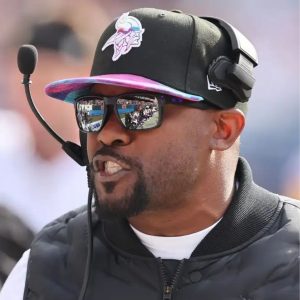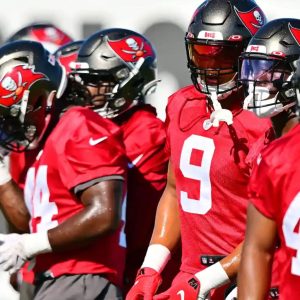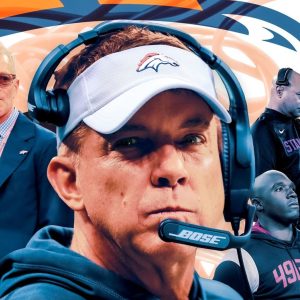Cleveland Browns head coach Kevin Stefanski surprisingly fired former offensive coordinator Alex Van Pelt shortly after the season. It was an up-and-down season for the offense, though it was mostly marred by injuries. The Browns earned the dubious honor of becoming just the second team in NFL history to make the playoffs while starting four different quarterbacks.
However, Stefanski has been under constant scrutiny as he is both a head coach and primary offensive play-caller. In today’s NFL, coaching staffs often exceed 20, and jobs have become increasingly specialized. Because Stefanski’s offense has been inconsistent, that scrutiny seemed to increase with each passing year.

Therefore, when Van Pelt was shown the door, many expected the Cleveland Browns to bring in a highly experienced offensive playcaller, similar to how the team added defensive coordinator Jim Schwartz this time last year. But instead, the team brought in Ken Dorsey, late of the Buffalo Bills.
Cleveland Browns: Meet the New Offense, Same as the Old Offense?
Dorsey is a name well-known to the Cleveland Browns fans. He is among the staggering 38 quarterbacks who have started for the team since they resumed operations in 1999. Dorsey comes with a resume of tutoring dual-threat quarterbacks like Cam Newton and Josh Allen to greatness.
However, his resume as an offensive coordinator is somewhat less impressive. He was Buffalo’s offensive coordinator for just a year and a half. After his firing in November, the Bills then won six of their next seven en route to a surprising AFC East title.
Who Will Call the Offensive Plays? Who Knows?
Dorsey’s hiring doesn’t inspire the same excitement as that of Schwartz. First, because Dorsey’s playcalling resume isn’t impressive, and second, because it’s not even clear who will be calling the plays. When asked who would be calling the plays, Stefanski had this to say.
“We’ll get there,” Stefanski said. “What I’m looking forward to the most is putting this offense back together, with Ken really leading the charge. And that’s why he’s here, and (we’re) really pleased to have him here.”
Dorsey himself had this to say:
“Playcalling to me is not as important as winning football games,” Dorsey said. “To me, it’s more about, what’s the decision that we feel most comfortable about moving forward to help our team win? …And that’s the only thing that matters to me. So whether Kevin’s calling it, I’m calling it, that’s to me, the most important thing is us as a team.”
So Why Was Dorsey Brought to the Cleveland Browns?
Here’s what Stefanski had to say about why Dorsey is the newest member of the Cleveland Browns coaching staff:
“You know when we made this decision very early on, Ken was a guy that we identified that could help us, help me, be an integral part of this offense. And Ken and I have known each other for a little while. We’ve kind of come up in this profession together if you will. Just watching Ken in college, in the pros, having success as a player, having success as a coach. He really fits who we are culturally. He’s a family man.”
Stefanski brought Dorsey to Cleveland because he was comfortable with him, and he fit in culturally. He did not bring Dorsey to the team to make any significant cultural or philosophical shift.
So why make the change at all?
Ken Dorsey’s Assignment: Make Deshaun Watson Elite Again
The Cleveland Browns committed a quarter of a billion dollars and three first-round picks to their franchise quarterback in early 2022. They knew his first season would be mostly lost due to his suspension and time off the game. However, as it turns out, Watson actually played more in 2022 than in 2023 due to injuries. Watson did go 5-1 this past season and generally looked better with each passing week.
But the offensive gameplan and Watson were seldom in sync. Watson, a strong-armed improviser who likes to work out of the shotgun, was more often than not asked to work a horizontal spread-like offense from under center. The offense also featured run-pass options, which Watson seemed particularly uncomfortable running.
Yet, under Joe Flacco, the simplified gameplans flourished. Flacco proved that Stefanski’s offense could be run at a high level by a strong-armed gunslinger. Gone were the RPOs and the horrific Jet sweeps. In their place, Stefanski brought heavy packages and more downfield passing with top targets David Njoku and Amari Cooper. It would seem as if the same concepts could be applied to Watson. That job will now fall to Dorsey.
Dorsey, for his part, seems to understand his assignment.
“I can get Deshaun ready to play each and every week,” Dorsey said. “I can get our room ready to play each and every week because we’ve got a great room and I’m sure we’ll add to that. And then I could help develop a game plan that’s going to help us be multiple, attack a defense in different ways, be aggressive, and be elite in what we do. And that’s the most important thing to me, just doing that to make sure if I’m in that role, hey, I’m going to do that at an extremely high level.”
More Offensive Ch…ch…ch…changes
Dorsey’s will not be the only new face in the Cleveland Browns offensive meetings in 2024. Tommy Rees joined the team as the Tight Ends Coach/Pass Game Specialist. Rees was the offensive coordinator for Alabama last season, leading them to a 12-2 season. He was also part of the Notre Dame staff for six years prior to that.
But the biggest blow to the Cleveland Browns is offensive line coach Bill Callahan. Callahan is widely acknowledged as one of the best line coaches in the NFL. His lines have consistently ranked near the top of the league wherever he’s been. But his son, Brian, was named head coach of the Tennessee Titans, and Callahan left to join him. It’s the first time a father has ever been hired by his son on an NFL staff. The Browns have yet to name a replacement.





